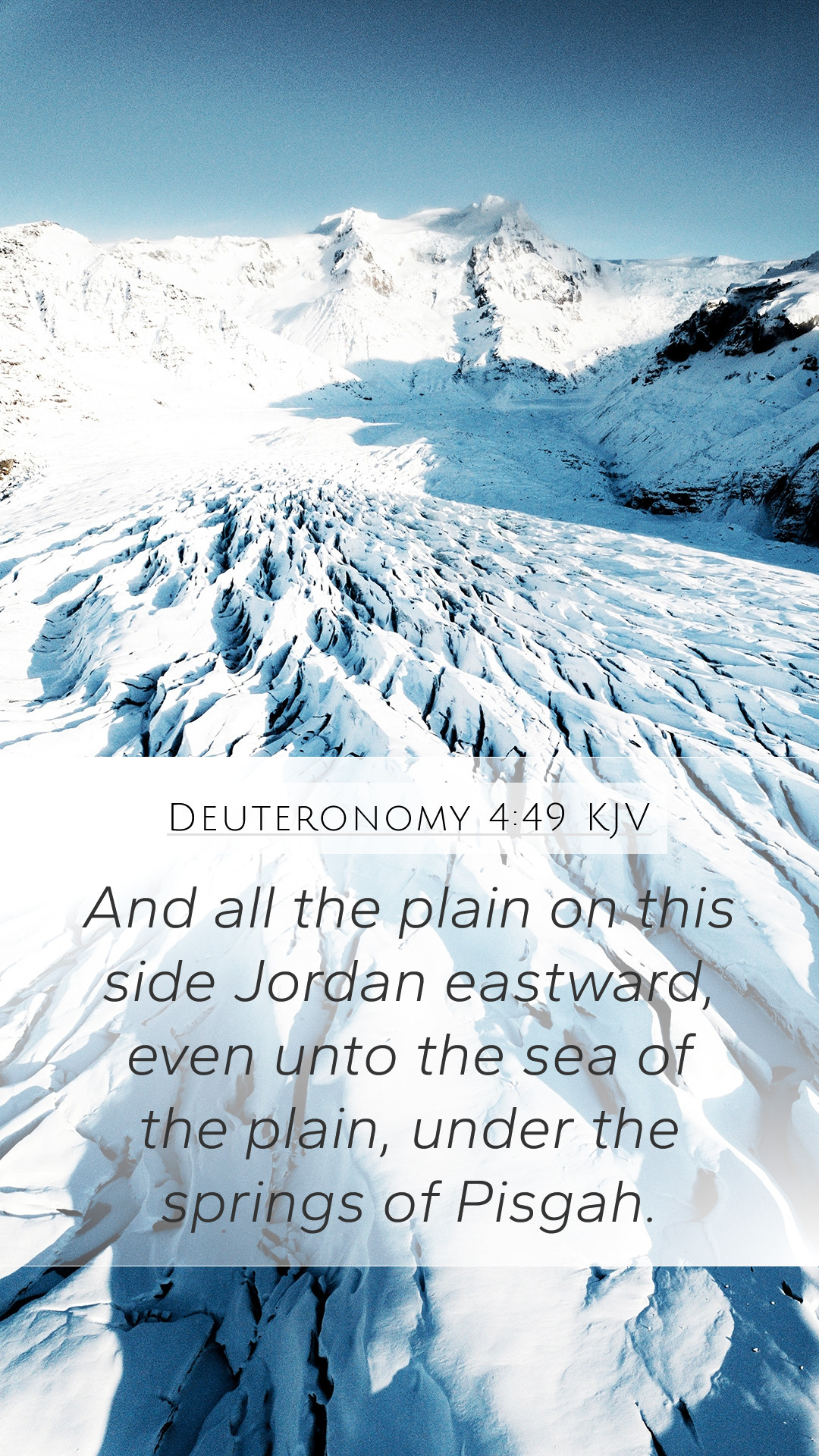Understanding Deuteronomy 4:49
This passage, Deuteronomy 4:49, plays a significant role in understanding the historical and geographical context of Israel's journey, offering insights into God's guidance and promises to His people. By examining public domain commentaries from biblical scholars such as Matthew Henry, Albert Barnes, and Adam Clarke, we can explore the profound meanings and interpretations associated with this verse.
Bible Verse Meaning
In Deuteronomy 4:49, it states, “And all the plain beyond the Jordan eastward, as far as the Sea of the Arabah, under the slopes of Pisgah.” This verse serves as a geographical marker, delineating the land that God has promised to the Israelites. It symbolizes both the tangible heritage that the Israelites would inherit and the spiritual promise of God's continued presence and guidance.
- Historical Context: Matthew Henry emphasizes the importance of the land as a fulfillment of God's covenant with Israel. The plains mentioned represent a rich and fertile area suitable for habitation and agriculture, echoing God's providence.
- Geographical Significance: Albert Barnes notes that the specific references to the East Jordan region and the Sea of the Arabah highlight the boundaries of the Promised Land. This establishes a clear delineation of the inheritance awaiting the Israelites.
- Theological Insights: Adam Clarke points out that this verse, while focused on geography, hints at deeper truths about belonging and identity for the Israelites as God's chosen people.
Bible Verse Interpretations
The interpretation of Deuteronomy 4:49 is multidimensional. It serves as a reminder of God's faithfulness in delivering promises and providing for His people. Each commentary offers layers of understanding:
- Promise of Inheritance: The mention of the plains illustrates God's assurance to the Israelites of their future home, signifying a transition from wandering to settlement.
- God's Guidance: This verse encapsulates the theme of divine direction, showing how God was actively involved in leading His people to a place of sustenance and security.
- The Connection to Worship: The geographical locations mentioned were also associated with places of worship, which signifies the intertwined nature of the land and the spiritual life of the people.
Biblical Exegesis
Engaging in biblical exegesis for Deuteronomy 4:49 allows us to draw out the nuances of the text:
- The description of the landscape sets a vivid stage for the reader, illustrating the beauty and abundance of the land God is giving to His people.
- Understanding the slopes of Pisgah is crucial, as it was known later as a significant viewpoint for Moses, representing the culmination of his journey and God's promises.
- By examining related verses, such as Deuteronomy 3:27 and Numbers 21:20, further clarity is gained regarding Israel's past and future within this promised territory.
Application of the Verse to Daily Life
The insights derived from Deuteronomy 4:49 can be applied to daily living in various ways:
- Embracing Promises: Just as God promised land to the Israelites, believers today can find assurance in God's promises for their lives, instilling hope and purpose.
- Recognizing Guidance: The verse encourages individuals to seek God's direction in their own journeys, embracing the idea that God is with them in their pursuits.
- Community and Identity: The geographical identity connects believers with a rich spiritual heritage, urging community and togetherness as God's people.
Related Bible Cross References
For further study and understanding, consider these related verses:
- Deuteronomy 3:27 - Moses' view of the Promised Land
- Numbers 21:20 - The plains of Moab
- Joshua 1:4 - The boundaries of the Promised Land
Conclusion
In conclusion, Deuteronomy 4:49 serves as a potent reminder of God's promises, direction, and the rich spiritual heritage of His people. The interpretations from various commentaries enrich our understanding, making this verse a valuable source for Bible study groups and individual reflections alike. For those engaged in online Bible study or seeking Bible study resources, this analysis offers a foundation for deeper exploration into Scripture analysis and biblical exegesis.
By understanding Scripture in its historical context and applying it to our daily lives, we can gain clarity on the meaning of Bible verses and the significance they hold in our spiritual journey.


